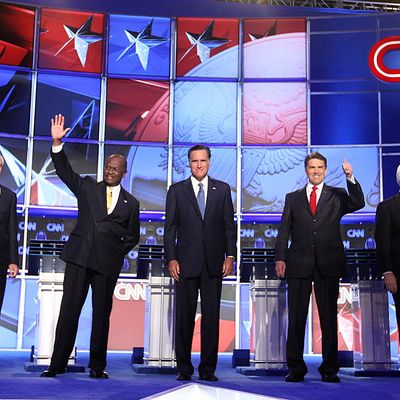
The Newtening is now well and truly upon us. Newt Gingrich, the deposed, disgraced former Speaker whose very campaign seemed to be an elaborate financial scam, is now leading the Republican primary polls and stands to benefit the most if Herman Cain collapses, having much higher ratings among Cain supporters than Mitt Romney does. It is extremely hard to tell if we should take this seriously. The argument against, as offered by such worthies as Josh Marshall and Jonathan Bernstein, is that the Republican elite would never allow it.
The analytic grounding for this view is a book called The Party Decides. I haven’t read it, but I have read quite a bit about it. The thesis is that, even after Party apparatchiks lost their ability to pick candidates in smoke-filled rooms, they learned to maintain control of the process by influencing voters. The classic example would be the 2000 Republican primary, which George W. Bush wrapped up behind closed doors long before a single vote was cast, though he did have to hold off an outsider challenge from John McCain. If the Party is deciding, they’re going to decide to nominate Romney, a vastly stronger choice than Gingrich.
I’ve shared that view for a long time. But lots of things are true for a long time, until something comes along and makes them no longer true. And that something might be the role of the debates.
The debates have been the central driver in the Republican primary, a campaign “morph[ing] into a kind of right-wing reality TV series,” as Ryan Lizza put it. Gingrich has been a master of the medium, pandering to every base right-wing impulse and attacking the media relentlessly. “There are very few moments in presidential debates that make a confirmed political cynic like me want to get off the couch and cheer like a hockey fan at the sight of blood,” wrote former Dick Cheney aide Shannen Coffin for the National Review after the last debate, “But Newt’s smackdown of Scott Pelley was, as Marc and Michael have both noted, well worth the price of admission.”
The debates have become a locus of the Republican fantasy of challenging Obama. A persistent undercurrent of Republican thought holds that the president is actually a dolt, helpless to express a simple thought without a prepared text. (That is the undercurrent of continuous Republican jokes about his use of the TelePrompTer.) Gingrich has promised to challenge Obama to seven debates, a thrilling prospect for many Republicans. “Gingrich is gaining ground among those who are convinced that the election will be won or lost in next fall’s debates with the president,” reports Edward-Isaac Dovere.
The more important function of the debates is that they circumvent the party apparatus. Republicans are less dependent on tuning into the media – in this case, usually Party organs like Fox News – to learn who the leading candidates are. They can squeeze the merchandise themselves. Certainly debates have existed before this cycle, but now they seem more frequent and far more influential. Viral moments are spreading farther and wider.
There are a lot of reasons to doubt that Gingrich can win. He has little money or organization, and the party still has tools to steer voters away from the suicidal act of nominating him. But Gingrich is a more authentic representative of the Party’s id in the age of Obama than Romney is, and he has a medium available to make that sale.






























